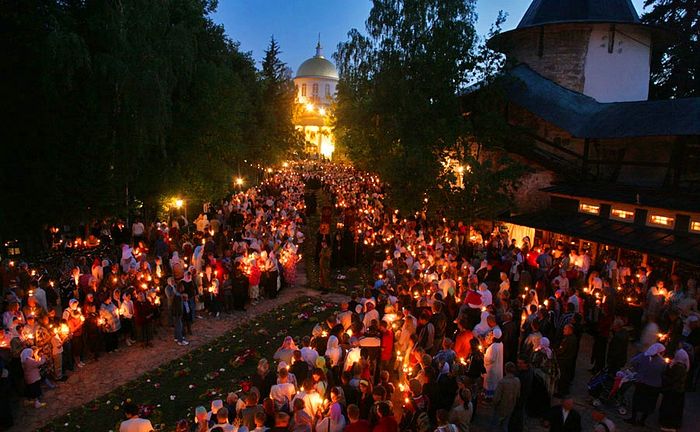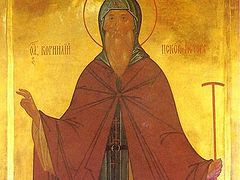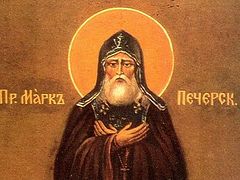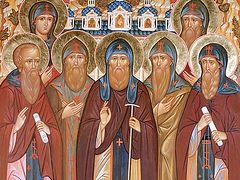 Cross procession on the Dormition of the Mother of God with her miraculous icon. Photo: Anatoly Goryainov
Cross procession on the Dormition of the Mother of God with her miraculous icon. Photo: Anatoly Goryainov There are so many people that we have to huddle closer together. A stout, rosy-cheeked lady in a red scarf with large white dots grumbles discontentedly at the old lady in black standing next to her: “Well, what’s with these people?! How can they eat so much garlic?! I can’t breathe!”
Then she humbly lowers her eyes and somewhat nervously blesses herself with the Sign of the Cross.
Lord, we are all so different, each with his own imperfections, his own thoughts, his own desires, not always pleasing to Thee…
One has come here for the first time—someone who rarely approaches the Mysteries, another has many years of experience in the spiritual life behind him, praying daily… One is a doctor, another a choir director, another a locksmith, another a retired general, another has had three husbands already, another came to implore about something… Here everything erases, dissolves, and becomes unnecessary. We’re all equal here.
And only one thing unites us all—faith, and the opportunity to be here now, in the Pskov-Caves Monastery, for the feast of the Mother of God. Perhaps this faith has not yet grown to the size of a mustard seed, but it’s there anyways, because the providence of God brought us here on this day, on such a feast! Lord, may faith instead of works be imputed to us.
I so want happiness!
“I’m not going home anymore, not for anything! I’m staying here!” a young girl says, sobbing.
“My dear, why are you howling like that? Who died?” a woman with a beautiful bronze tan, shaded with a snow-white scarf says to her.
“No… no one died…” she answers helplessly, tears drying instantly; the question about death apparently brought her to her senses somewhat. “It’s just that… My husband called me, and cursed at me for not telling him I was coming here… If I go home I know he’ll give me no rest… I’m so tired of it already… Others have peace and love, and we have only battles… I so want happiness, that our love would be real, our whole lives.”
“Happiness?... Well what do you know? Happiness she wanted… You’re still young… Happiness is when the Lord is here, in the heart… But men—is that really happiness? As for your husband—be patient, be patient… Don’t you dare get a divorce. Listen to me, you silly, sinful girl…
“I had such a husband… Oh… You can’t even imagine. He would raise his hand, and berate me so, that the neighbors’ ears would wilt. I did not endure… I was young, just like you. I wanted happiness. I left for someone else, and how I regret it now…
“I thought—happiness, love… But happiness didn’t develop, and there was no love. Just one sin has remained my whole life, and how much sorrow I have suffered for this sin… Oh… And finally the Lord began to give me happiness. I was in Diveyevo not along ago, and the Mother of God sent me, a sinner, here… And you know what, young lady? Instead, of howling, go and adorn the road with flowers.1 Serve and pray to the Mother of God, and you will see how she governs. And be patient, be patient… Do you understand?”
The girl nods her head in response and crosses herself; obviously the words of this unknown pilgrim entered directly into her soul.
I have to see her
“Enough chatter—they’re bringing the icon out already, and the choir has started singing! What did you come here for? To pray or to have conversations?” they hush in the crowd.
“No; is it some kind of folk choir? Do you hear how they’re singing?” the blond middle-aged woman with playful curls coming out from under her colorful scarf standing near me says.
I just keep quiet and smile at her.
“And I’m a choir director, by the way,” she adds, but she’s already talking to someone else, to a man in a stylish suit.
“Good people, make way… I ask you, please, make way, good people… I have to see her…” a weak elderly woman’s voice is heard from a distance.
I instinctively turn around and gaze upon the colorful mass of believers. The small, wrinkled old woman tries to make her way through thousands of people, pushing her fragile arms between them—twigs in the sleeves of her battered old coat.
“What can I do, granny? Everyone wants to move forward! Stay where you are so you don’t get crushed!”
“But I have to… I really need to at least look at her… Just to see her, let me through, sonny, alright?”
“Who do you need to look at? Just stand and pray where you are.”
“At her… at the Mother of God, at the icon of her Dormition…” granny squeaks out.
“What do you need to look at her for? Pray, grandma; she sees you!” says a broad-shouldered man blocking her way.
She freezes, and only silent tears cover her tired, kind face spotted with wrinkles.
Where did this grandma come from? What path brought her to this monastery; what kind of trouble, or perhaps, joy led her to this feast?
I suddenly recall the Gospel woman suffering from the issue of blood, For she said within herself, If I may but touch His garment, I shall be whole (Mt. 9:21).
Perhaps she too was thronged by the crowd surrounding the Savior, but she, in tears, exhausted from the torment of her illness, forced her way further and further ahead, whispering, If I may but touch His garment…
I dive into the crowd, and firmly squeezing the hand of this little old lady, start to push her to the first row; and by some miracle, I managed. My seven-year-old child was standing in the front row, and I quickly change their places.
“There she is,” I whisper to her, pointing to the Dormition icon of the Mother of God.
She reverently crosses herself, wiping the never-ending stream of tears with a corner of her scarf, and then, nuzzling up to my shoulder, covers my hand with wet kisses. I step away in embarrassment, and for some reason I also start to cry.
Our tenderness of heart is interrupted by a ring on her cell phone. Still whisking away tears and crossing herself, my grandma pulls a cheap cell phone out of a canvas bag. Written on the screen: Grandpa.
“Grampa, thank God! I saw her!” she yells into the phone.
“Shame on you! You rushed ahead, so stand there and pray!” the crowd begins to say indignantly.
“Sorrows are sent for talking during the Divine services,” someone immediately observes.
And we all hush, listening attentively to the words of the prayers.
The strict but kind Fr. Philaret
The faces of monks are strict, but somehow close, like family, as if you have known every one of them for a long time.
“Clear a path… Everyone, step back, out of the front row!” rings out the intimidating and commanding voice of Archimandrite Philaret right in front of us. In another time, not so long ago, this same voice dispersed the crowd bombarding the legendary elder John (Krestiankin) with questions.
“Philaretushka,” my son affectionately says, watching as Batushka bypasses the long rows of pilgrims. His child’s heart has flared up with some wonderfully touching love for Fr. Philaret from our first trip to Pechory.
Fr. Philaret is especially strict on the feast of Dormition. He spreads out the streams of believers, so no one would be smooshed, and everyone would be comfortable.
There remains for him only to look with his formidable eagle eyes, as everyone humbly parts. And no one is offended, but we hear only, “God bless Batushka! What would we do without him?!”
“You know what kind of mama he had!” a well-dressed grandma with an angelic face framed by snow-white hair standing near me says in admiration. “A holy woman!”
“Did you know her personally?” I asked interestedly.
“I knew her… She lived by the monastery and her home was always open for pilgrims. God vouchsafed us to stay with her. She received everyone absolutely for free, and even fed them… Oh, and how deliciously she fed us… Like soup, you know, fasting—water and oats, and such a flavor that I never had a more delicious soup… We all asked her: ‘Raisa, how does it turn out so good? Tell us your secret,’ but she didn’t say anything. She was strict too, but very kind. She knit scarves for sale, and she gave all the money to the monastery… Such a woman… May she inherit the Kingdom of Heaven!”
“Mama, look, Fr. Philaret gave me a gift!” my son joyfully chirps, tugging at my sleeve. A beautiful box in his hands, tied with a crimson ribbon, the top of the box transparent—a gingerbread angel with golden-white wings looking at us through it.
At home
We’re home. Like a dream, the memory of Fr. Philaret’s imposing voice is wiped from my memory, the chiming of the Pskov-Caves bells subsides, sunken into my soul; not immediately, but gradually, over the course of a series of idle conversations, the feeling itself of indescribable closeness to God, which especially arises in me there, is forgotten.
We didn’t eat this angel for a long time, this memory of Pskov-Caves Monastery, the blessing of the strict and kind Fr. Philaret. But my son sighed and decided: “Mama, after all, it’s just gingerbread; we have to eat it before it goes bad!”
He quiveringly opened the box and pulled the angel out into the room.
“Dear Fr. Philaret!” I heard. “Thank you so much for this gift; I really love you, but I really want to eat this gingerbread.”
I went up to my son and hugged him. “And can I have a bite?”
The gingerbread turned out to be unexpectedly soft, fresh, and especially delicious; every bite melted in my mouth, leaving an aftertaste of joy and celebration. And again in my memory resurfaced the sleeping recollections of the warm touch of the blessing hand of Fr. Philaret, the sound of the bells, the smell of the fresh grass, having a taste of the aroma of flowers from the same road where the girl dreaming of a happy marriage was working, and along which they carried the Dormition icon with prayer and reverence—the same one the old lady absolutely had to see, with tears in her kind eyes.




